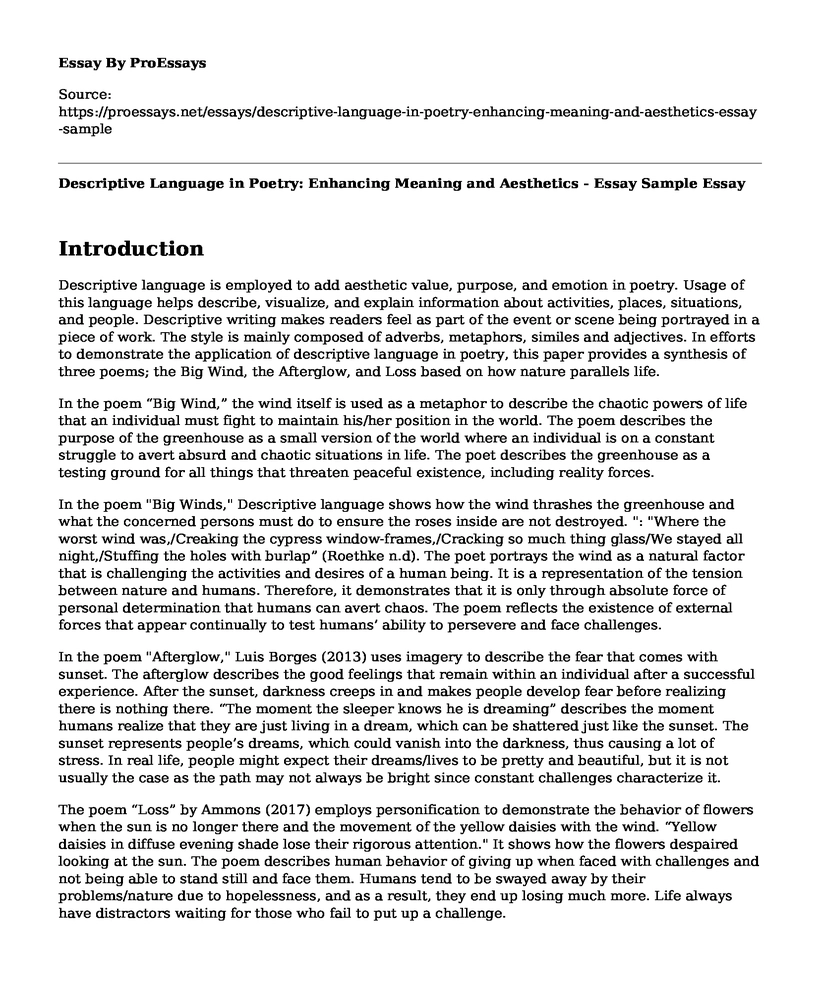Introduction
Descriptive language is employed to add aesthetic value, purpose, and emotion in poetry. Usage of this language helps describe, visualize, and explain information about activities, places, situations, and people. Descriptive writing makes readers feel as part of the event or scene being portrayed in a piece of work. The style is mainly composed of adverbs, metaphors, similes and adjectives. In efforts to demonstrate the application of descriptive language in poetry, this paper provides a synthesis of three poems; the Big Wind, the Afterglow, and Loss based on how nature parallels life.
In the poem “Big Wind,” the wind itself is used as a metaphor to describe the chaotic powers of life that an individual must fight to maintain his/her position in the world. The poem describes the purpose of the greenhouse as a small version of the world where an individual is on a constant struggle to avert absurd and chaotic situations in life. The poet describes the greenhouse as a testing ground for all things that threaten peaceful existence, including reality forces.
In the poem "Big Winds," Descriptive language shows how the wind thrashes the greenhouse and what the concerned persons must do to ensure the roses inside are not destroyed. ": "Where the worst wind was,/Creaking the cypress window-frames,/Cracking so much thing glass/We stayed all night,/Stuffing the holes with burlap” (Roethke n.d). The poet portrays the wind as a natural factor that is challenging the activities and desires of a human being. It is a representation of the tension between nature and humans. Therefore, it demonstrates that it is only through absolute force of personal determination that humans can avert chaos. The poem reflects the existence of external forces that appear continually to test humans’ ability to persevere and face challenges.
In the poem "Afterglow," Luis Borges (2013) uses imagery to describe the fear that comes with sunset. The afterglow describes the good feelings that remain within an individual after a successful experience. After the sunset, darkness creeps in and makes people develop fear before realizing there is nothing there. “The moment the sleeper knows he is dreaming” describes the moment humans realize that they are just living in a dream, which can be shattered just like the sunset. The sunset represents people’s dreams, which could vanish into the darkness, thus causing a lot of stress. In real life, people might expect their dreams/lives to be pretty and beautiful, but it is not usually the case as the path may not always be bright since constant challenges characterize it.
The poem “Loss” by Ammons (2017) employs personification to demonstrate the behavior of flowers when the sun is no longer there and the movement of the yellow daisies with the wind. “Yellow daisies in diffuse evening shade lose their rigorous attention." It shows how the flowers despaired looking at the sun. The poem describes human behavior of giving up when faced with challenges and not being able to stand still and face them. Humans tend to be swayed away by their problems/nature due to hopelessness, and as a result, they end up losing much more. Life always have distractors waiting for those who fail to put up a challenge.
The three poems all have one thing in common; they all demonstrate a relationship between nature and human life. By using nature, the poems demonstrate how humans must always be strong enough to fight external forces in their lives. In facing the challenges, humans must develop the will and ability to emerge as winners and not as losers.
References
Ammons, A. R. (2017, November 16). Loss. Words for the Year. https://wordsfortheyear.com/2017/11/16/loss-by-a-r-ammons/
Borges, J. L. (2013, August 25). Jorge Luis Borges. Afterglow – English version. https://thepassengertimes.com/2012/01/31/jorge-luis-borges-afterglow-english-version/
Roethke, T. (n.d.). Big wind. PoemHunter.com. https://www.poemhunter.com/poem/big-wind/
Cite this page
Descriptive Language in Poetry: Enhancing Meaning and Aesthetics - Essay Sample. (2023, Aug 10). Retrieved from https://proessays.net/essays/descriptive-language-in-poetry-enhancing-meaning-and-aesthetics-essay-sample
If you are the original author of this essay and no longer wish to have it published on the ProEssays website, please click below to request its removal:
- An Unweeded Garden: The Use of Floral Symbolism in Shakespeare's Hamlet
- Siddhartha Essay
- Shakespeare's Twelfth Night Essay
- The Moral Justification Against and in Favor of Torture in 1984
- Essay Sample on Literary Devices
- Literary Analysis Essay on Milosz Poetry
- Paper Example on Hispanic People: Different Treatment According to Age, Gender, Social Position







